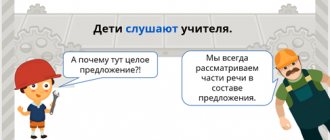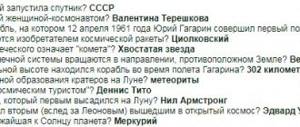Linguistic tournament on the topic “Noun”; 5th grade
A general lesson, conducted in the form of a linguistic game, is intended for 5th grade students. A linguistic tournament allows you to repeat and systematize information about a noun as a part of speech in a playful way, stimulate the creative and cognitive activity of students, develop communication skills, critical thinking, improve group work skills, control and self-control skills, teach the rules of teamwork, develop interest to the subject through a situation of success.
The lesson includes different types of tasks: guessing riddles, drawing up a “morphological portrait” of a noun, “auction” of words, solving linguistic equations, “collect words”, “guess the word”. In addition, students prepare a creative presentation of teams in the form of dramatization and songs on the topic of the lesson.
Objectives of the lesson: in a playful way, repeat and systematize information about the noun as a part of speech; stimulate the creative and cognitive activity of students: develop communication skills, critical thinking; improve skills of independent work and work in groups, control and self-control skills; teach the rules of working in a group, in a team; cultivate a culture of educational work, develop interest in the subject through a situation of success.
Lesson equipment: screen, slide projector, task cards, prizes for winners, “magic” package.
Progress of the lesson Teacher's opening speech: - Guys, we have studied a large and interesting topic “Noun”. Today I invite you to remember in a playful way everything we have learned about this amazing part of speech. The form of our lesson is a linguistic tournament. This form of work is familiar to you. This year you took part in the school Olympiad in the Russian language, in the All-Russian Olympiad “Russian Bear Cub”, in the International Olympiad and showed good results. If you are truly interested in linguistics, then in high school you can participate in the Lomonosov tournament.
Let’s remember what the word “tournament” means. (Slide No. 2) Tournament (German): 1. Military competition of knights in medieval Western Europe; 2. Form of individual or team competitions with more than two participants. — Pay attention to the keywords: individual or team competitions. These words impose a certain responsibility on you.
For the outcome of the tournament to be successful, you need to know and follow certain rules. (slide No. 3)
Linguistic tournament rules. 1) Help your team, don’t interfere with other teams. 2) Be persistent, but don’t rush. Don't be funny with your answer. 3) Be proud of your successes and respect the success of others. 4) Do not brag beyond measure, do not shout - Conceit is the executioner! Have you learned everything? Go ahead, curious people! The tournament will be entertaining, Listen to the tasks carefully, And whoever falls asleep will leave with nothing!
1. Representation of a noun by commands (Appendix No. 1)
- “Allow me to introduce myself” (team “ABVGDeyka”)
- “Capricious foreigner” (team “Whychki”)
- “Amazing nouns” (team “Linguists”)
2. Warm up. (Guessing riddles. For each correct answer, the team receives 1 point) *** He lay there, lay there, and ran into the river. (Snow) *** Not alive, but speaks all languages. (Echo) *** Day and night it knocks, As if wound up. It will be bad if this knocking suddenly stops. (Heart) *** He trails behind you, At least he remains in place. (Next) *** I’m a hunchbacked beast, but the guys like me. (Camel) *** He makes noise in the field and in the garden, But he won’t get into the house. And I'm not going anywhere until he passes. (Rain) *** Round eyes blink, Predatory beak is always a hook. At night she flies, Sleeps in a hollow during a fine day. (Owl) *** Both in the rain and in the heat A reliable friend will help us take shelter: He will stretch out dozens of hands and thousands of palms. (Tree) *** She comes with affection and her fairy tale. He waves his magic wand and a snowdrop blooms in the forest. (Spring) *** Which pet likes to look at the new gate? (Ram) *** What is the name of the car's eye? (Headlight) *** What is the name of freshly frozen rain? (Grad) *** What is the name of the architectural structure of bees? (Beehive) *** Who is the forest drummer? (Woodpecker) *** Name a product that cannot be spoiled with oil. (Porridge)
3. Drawing up a “morphological portrait” of a noun (each team receives 1 point for the correct answer)
- Rain (common noun, masculine, 2nd declension, singular, nominative case);
- owl (common noun, animate, feminine, 1st declension, singular, nominative case);
- heart (common noun, inanimate, neuter, 2nd declension, singular, nominative case)
Teacher's question: - Why didn't you define the syntactic role of nouns? (To determine the syntactic role of a noun, you need to enter the noun into the sentence)
4. “Auction” (slide No. 2) A) Introduction to the concept. Auction (Latin) – a method of selling goods in which the goods are purchased by the person who offered the highest price for it
B) Assignment to teams: in one minute, name:
- Full names of famous writers;
- Full names of famous composers;
- Names of famous artists
(For each correct answer the team receives 1 point)
5. “Boomerang” (slide No. 2) A) Introduction to the concept of Boomerang (English) - a curved wooden throwing club, which, having described the curve, returns to the thrower.
B) Assignment to the teams: choose adjectives for nouns (the one who last names the adjective wins)
- Jury (strict)
- Kohlrabi (delicious)
- Chimpanzee (cheerful)
- Royal (black)
- Taxi (new)
- Coffee (black)
- Cafe (nice)
- Madam (elderly)
- Salami (fresh)
- Tbilisi (beautiful)
- Tulle (new)
- Sukhumi (wonderful)
- Callus (rough)
- Jam (sour)
- "Humanité" (morning)
- Mississippi (wide)
6. Solving linguistic equations (2 for each team) 1. Land - land Shoe - X
2. Boots – boot Boots – X
1. Director - Directors Cake - X
2. Socks - socks Boots - X
1. Player - players Professor - X
2. Pineapples - pineapples Apples - X
7. Choose antonyms. Anger (kindness) Cowardice (courage) Indifference (activity) Laziness (hard work) Deceit (honesty) Quarrel (friendship)
8. Captains' competition (3 points for each correct answer) 1. “Silence.” Show a noun using gestures (fans guess; captains choose cards)
- sandwich
- crib
- mosquito
2. “Collect words” Adviser- -gonok- Bear- -chick- Bicycle- -hic- Boast- -un- Knife- -ist- Lock- -ek-
3. Choose nouns for the words: Rinse... Rinse... Boil... Open... Sit... Turn grey...
9. Task for all participants (carried out // with a competition for captains): compose and write down as many nouns as possible from the letters of the word noun. (Creature, bream, crack, thing, zero, twist, mustache, chair, dream, nose, tone, summer, advice, forest, village, raccoon, deer, trunk, fishing, ox, whistle)
10. Erudite competition (those students who scored the most points participate) (slide number 11)
- What will change in the words carnation, castle if the stress is shifted from the first syllable to the last?
- Can these words be different parts of speech? Prove your point. Swarm, howl, oven, abyss, sick.
- Determine which part of the sentence the highlighted words are.
Mom put cabbage pies in the oven to bake. A blanket of snow covered the entire ground. The fishermen ate dry bread with fish soup.
11. "Magic package." Guess what's in the package. This item is universal. It gives information about spelling, lexical meaning, and rules of pronunciation of nouns. For those who have forgotten the morphological features of a noun, this item will help them remember them. This item is our friend and indispensable assistant! (Appendix to the Russian language textbook)
12. Summing up. Winner's reward ceremony.
Appendix No. 1 Representation of a noun by commands. 1) Team “ABVGDeyka” (Sketch) Hello everyone!
Let me introduce myself. My name is Noun. Considering my name, you can understand that I am the most essential part of speech in the Russian language. I am completely independent and independent and do not need anyone's help. I can answer questions who? What?, I denote an object, natural phenomena, feelings and human states. I can be any member in a sentence. I have constant morphological characteristics: if I want, I will be my own or a common noun, animate or inanimate, masculine, feminine or neuter! I also have a declination: 1, 2 and 3!
But I’ll be honest: I can be capricious and unpredictable, which is probably why my distinctive feature is inconstancy. I can easily use the singular and plural, and change cases like gloves! The most enjoyable thing for me is to be animated. But, unfortunately, the words dead and deceased stick to me, and this is so terrible!
I will note without false modesty that without me our whole life would be boring and uninteresting. Imagine saying: “They are falling, yellow, red...” What is falling? Who's yellow? Can not understand anything! Another thing is a sentence with my participation: Yellow and red leaves fall to the ground. Isn't that better?
And what poems are written with my help! Let's remember the wonderful poem by A. Fet: Whispers, timid breathing, The trill of a nightingale, Silver and the swaying of the Sleepy stream... There are 23 nouns and not a single verb in this poem! Treat me with respect and I will always be your friend!
2) Team “Why” (Staging) Capricious foreigner One day, a Foreign Word arrived in the Russian language dictionary. Our language has always maintained friendly relations with other languages, so Foreign Word was greeted very kindly. This word turned out to be a Noun, so he was offered a choice of any declension. “But first you need to find out what kind of person you are,” they explained to him. “Sorry,” said the Foreign Noun. – I’ve been traveling all over the world for so long that I’ve completely forgotten my family. - But how will you bow then? – the Dictionary was surprised. - Bow down? To whom should we bow? I never bow to anyone, I am an independent and free person. “Excuse me,” the Dictionary was indignant. - After all, there is a common rule of politeness. Nouns are inflected as a sign of respect for other words they appear in the text, as well as in recognition of the Common Rules of Grammar. “Mercy,” answered the Foreign Noun. This is not in my rules, it does not concern me. “Then we will not be able to receive you,” said the Nouns of the First and Second Declension. Third declension nouns said nothing. They were very well-mannered and delicate, because they all belonged to the female gender.
So the Foreign Noun settled in the Russian language as an indeclinable.
But a word cannot live in a text without communicating with other words. Foreign Noun wanted to get to know Verbs and Adjectives better. Having become acquainted with them, Foreign Word very quickly became convinced of what simple, responsive and well-mannered words they were.
For the sake of the Indeclinable Noun, Verbs were conjugated, Adjectives agreed with it. It was so pleasant that the Foreign Noun felt ashamed to act up.
Gradually, the Foreign Noun found its gender and truly appreciated it. It has found a home in the Russian language, and today the foreign words coffee, taxi, salami, and piano have become full-fledged residents of the Russian language. And the capricious Foreign Noun became polite and delicate!
3) Team “Linguists” (Song) Hello!
We are indeclinable nouns! There is a whole tribe of us: 10 nouns with -name and the masculine noun path. We differ from all other nouns in that in the genitive, dative and prepositional cases we are declined like nouns of the 3rd declension and have the ending –i. And in the instrumental case we have the ending –em (em), like nouns of the 2nd declension. We are cheerful, mischievous, and love to fantasize. Listen to the song we composed to ourselves. There is a story about a tribe. Only in the spring will the time come, The tribe sows the seed peacefully, Even though plowing and sowing is a burden. The cow has a full udder, the Papuan woman needs a name for her son And milk the cow. But our leader, with his foot in the stirrup, having attached a feather to his crown, raised a banner above himself, fanning the flames of discord: Calling on everyone again Not to work - to fight! But the tribe does not want to shed blood in vain again, The peaceful path is dearer to everyone... Don’t forget our song! Full text of the material Linguistic tournament on the topic “Noun”;
For grade 5, see the downloadable file . The page contains a fragment.
| Author: Yakushkina Tatyana Mikhailovna → Publisher 08/03/2017 0 9564 237 | Comment |
Thank you for your mark. If you want your name to be known to the author, log in to the site as a user and click Thank you again. Your name will appear on this page.
Login | Registration
Have an opinion? Leave a comment



